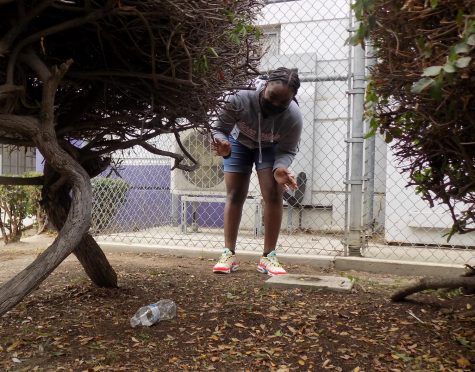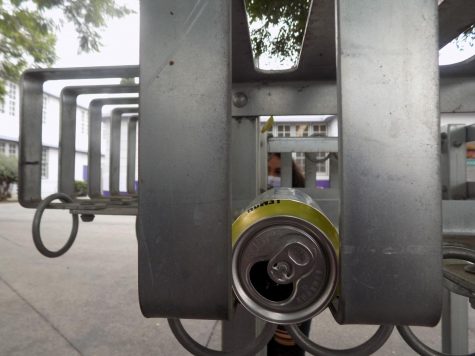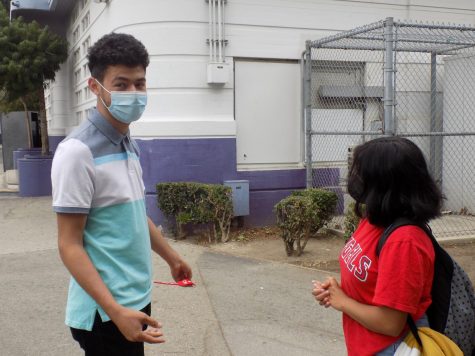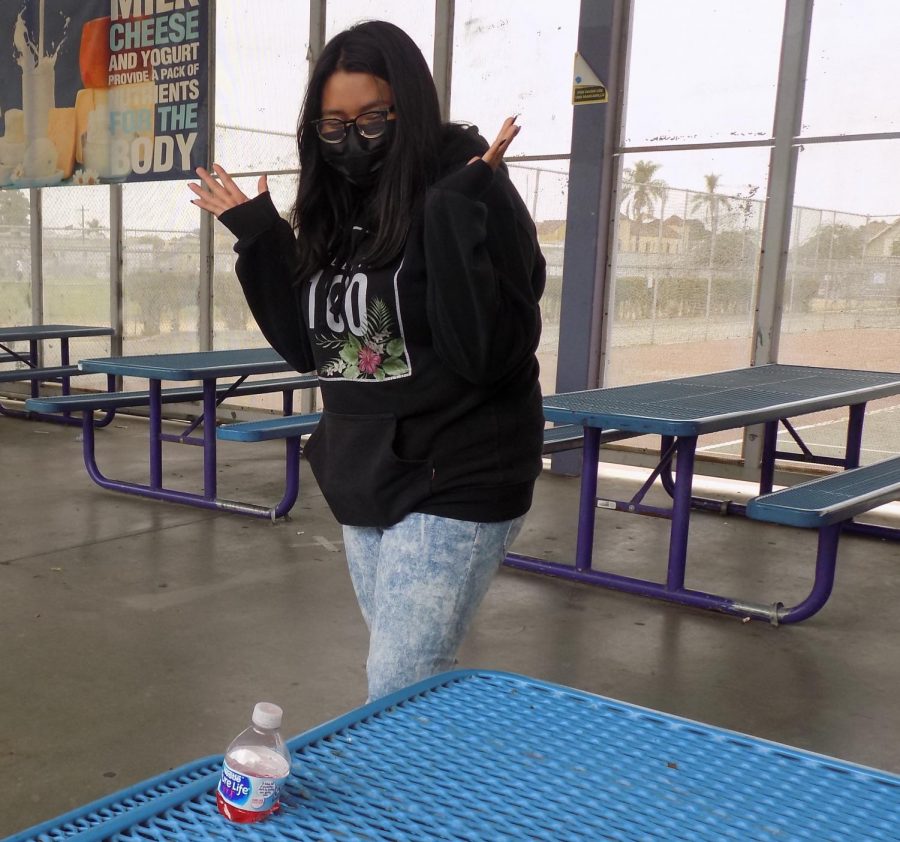No Trash, Bruh!
October 7, 2021
No matter how it goes, thrash is trash. The spread of disease always comes from the same places like human contact, the air, and items around our environment. Using that fact, preventing the spread of bacteria is our number one priority as students looking after one another. To an extent, we can help each other by picking up after ourselves.
One day, I walked into a classroom and I saw a cup on the table. The cup had a straw with some kind of drink in it. I had to grab the cup, walk to the trash can, and throw it in the trash can. I felt a little frustrated because I had to clean up after someone else.

We can help clean up after ourselves, but it’s annoying. The main reason why people get infected with filth is by contact touch by our own exposure to the surfaces of the world. If everyone had the same mindset, we can all contribute to one cause and eliminate the potential risks that leaving litter can hurt a person you love.

When you walk into a classroom, how do you expect it to look? I can guess you want a nice spacious, clean and safe classroom. You want this because it’s a more suitable learning environment. If the class is already clean, we have no problem in our way of learning. However, if we pick up trash before class, it is taking time from our own education.
Christopher Villareal says, “it’s like moving into a new house and finding out that the previous owners left trash. Now, it becomes your problem.” I’m sure everyone maintains their house clean. Being clean at school is a reflection of being clean at home.
When people leave trash around, this “shows how people live at home,” says Edwin Murcia, a proud Manual Arts Toiler. He agrees that trash can become a bigger problem in our society.

For example, trash can end as pollution in our water. Water pollution is one of the biggest hazards in our society, causing the water to be unusable.This includes the water that we drink from the water fountains and even our local water ponds and beaches.
Felisa Oxlaj doesn’t drink the water from the water fountains because she believes it is not drinkable.
“I always see juice boxes, bags of chips, and soda cans around the water fountains,” says Felisa Oxlaj, a senior at Manual Arts, “I even see used lined paper. It’s probably someone’s homework!”
Overall, there is no benefit of leaving trash in our living spaces. The end results affects us all. Let’s keep our school clean! Say no to trash, bruh!


Jonathan D • Aug 19, 2022 at 10:53 am
I agree! We should all help and throw trash away. We should keep our school clean.
Adelaida Garcia • Aug 19, 2022 at 10:48 am
Picking up trash is very important. Our school is being affected by trash because people can’t pick up after themselves. It is important to spread awareness about this issue to other students so that now everyone can contribute and pick up after themselves.
Matthew Cuellar • Aug 19, 2022 at 10:44 am
As a fellow student, I always expect to walk to school and see no trash. So let’s pick up our trash and throw them away.
Jonathan • Aug 19, 2022 at 10:42 am
I agree! We should all work together to keep our school clean.
Elizabeth Martinez • Aug 19, 2022 at 10:33 am
We can all contribute to keep our school together. Clean school promotes a good attitude in everyone. When things are orderly and clean, everyone benefits in some way.When the entire school is kept clean, you’ll experience a stronger shared sense of school pride. People will feel good about showing their school off and students and teachers alike will be proud to talk about their school.
Don Julio • Jul 14, 2022 at 10:11 am
If everyone threw there trash away there would be no trash. Stop being lazy and pick up behind yourself. This helps you and everyone around you.
Gissell • Jul 14, 2022 at 9:29 am
I agree that everyone put their rubbish in its place because bacteria can cause serious illnesses for the society.
Kaleenie • Jul 14, 2022 at 9:18 am
This article is very important and helpful because it tells us how not throwing away your trash can effect our water and make us sick. Being clean at school shows how you would also be clean at home. This is very true!
Cesar • Jul 14, 2022 at 9:18 am
Always pick up after yourself and don’t just leave your trash everywhere.
jeimy • Jul 14, 2022 at 9:09 am
I agree! We should keep a clean environment at school and have a clean space to study.
Jose • Jul 14, 2022 at 9:09 am
Everyone, please throw away your trash.
DEJAME • Jul 14, 2022 at 9:08 am
Trash can give germs and bacteria which can make people sick. We have to clean up to keep the Earth safe.
Ana . • Jul 13, 2022 at 1:54 pm
What I learned about this article is that we can help to clean everything. And how to take care to use the school properties such as chairs, tables, duster and chalks properly . We need to work as a team to keep our school clean and safe.
richard • Jul 13, 2022 at 1:52 pm
No trash, bruh! Please clean the school. It’s our school. Please!
Victor • Jul 13, 2022 at 1:48 pm
This article is a very important one because you can see the joy kids have picking up trash, and it tells you that is very important to keep your environment safe.
maya • Jul 13, 2022 at 1:45 pm
I feel like I don’t even notice trash anymore because of how common it is to see it on the ground everywhere. But now I can see how big of an issue this is, and every time I see trash on the ground, I will throw it away.
richard • Jul 13, 2022 at 1:44 pm
no trash BRUH kk lol
from richard F and the chact
Marcia • Jul 13, 2022 at 1:42 pm
I extremely agree with this article. It is very annoying to pick up after people. Everyone can do their part to keep our school clean.
kamilah • Jul 13, 2022 at 1:42 pm
I learned to always throw my trash away and keep my school clean.
Allyson • Jul 13, 2022 at 1:40 pm
I enjoyed reading this article.
Ale • May 27, 2022 at 11:42 am
This article made me realize that it is important to throw garbage in the dumpsters.
Diego • May 27, 2022 at 8:47 am
I am going to throw trash away
Elizabeth Martinez • May 26, 2022 at 9:17 am
We can all contribute to keep our school together. When the entire school is kept clean, you’ll experience a stronger shared sense of school pride. People will feel good about showing their school off and students and teachers alike will be proud to talk about their school.
x_Dominic_23002 • Mar 18, 2022 at 10:52 am
I learned alot from this article, it eduacton me, to throw trash.
Marissa Gonzalez • Dec 9, 2021 at 11:56 am
The article shows us how to take better care of the earth inside of school and outside of school. We are all humans and should clean after ourselves.
Nataly • Dec 9, 2021 at 11:54 am
I look fine in that picture, but besides that I think it is really important for us to keep our community clean and where we learn. And we as students should keep where we eat and where we sit and not be dirty people. We need to be better and not give people that cleans the school too much work because it’s not fair. You wouldn’t like it if someone comes over at your house and makes a mess and has you to clean it.
Alberto Escobar • Dec 8, 2021 at 10:42 am
I think we should keep the school more clean, and students should be more organized.
Juliana Solano • Dec 7, 2021 at 10:11 am
The Article “No Trash, Bruh!’ by Dominic Hernandez talks about how we should throw our trash in trash cans to keep our school clean.For example, one day Dominic Hernandez had to throw someone else’s trash in the trash can , which made him a little annoyed that he had to clean up for someone else. This shouldn’t happen.
Jeremy F. • Dec 7, 2021 at 10:07 am
In “No Trash, Bruh” by Dominic Hernandez, it made me think that we should keep our school clean all the time.
Yeyson Garcia • Dec 7, 2021 at 8:48 am
“No Trash, Bruh” made be believe that we shouldn’t be throwing trash in the school, so we can keep the school clean and nice.
Luis Mejia • Dec 7, 2021 at 8:43 am
In “No Trash, Bruh” by Dominic Hernandez, I learned that we have to keep our school clean.
Rancid • Oct 12, 2021 at 10:47 am
The article is atriculate and clever. “Thrash is trash” was a nice play on words. 5 stars out of 5